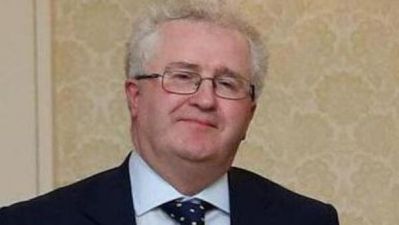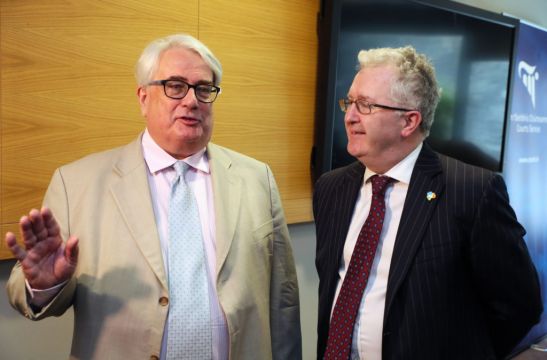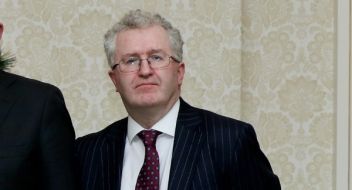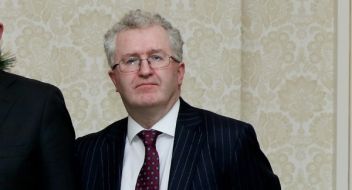In a series of letters between Chief Justice Frank Clarke and Judge Séamus Woulfe, the two judges reveal the divisions between that exist between each other.
In the wake of the Golfgate scandal, the Supreme Court asked former Chief Justice Susan Denham to investigate the circumstances of Judge Woulfe’s attendance in Galway.
She reported saying his removal from office would have been “unjust and disproportionate” and that it was for the current Chief Justice to close the matter by informal resolution.
Attempts at convening a meeting with Judge Woulfe were unsuccessful as he cancelled or sought a postponement on a number of occasions, to the clear annoyance of the Chief Justice.
The two men finally did meet last week and in the wake of that meeting, the Chief Justice wrote to Judge Woulfe.
According to the Irish Examiner, the tension between the two judges is evident in their corresponding letters.
LETTER 1: Chief Justice Frank Clarke to Judge Séamus Woulfe, November 5th
“The event did not comply with the guidelines announced by the Government on August 18, which were intended to reduce the numbers permitted at an indoor social event to six persons.
“A failure by a judge to observe these principles can lead to serious damage to public trust in, and respect for, the judiciary. That has occurred in this case, at a time when trust and confidence in the institutions of the State, and social solidarity more generally, is particularly important. I am required, therefore, to reprimand you in respect of your conduct,” Judge Clarke wrote.
He added
“As you know, I have no powers, under the Constitution or any relevant legislation, to impose any formal sanction on a member of the judiciary. In respect of your attendance at the event in Clifden, I must inform you, however, that you will not be listed to sit as a judge until February 2021 and I strongly suggest in those circumstances that you should make arrangements to either waive or repay your salary for this period (for example by utilising s.483 of the Taxes Consolidation Act, 1997).
“In that context you repeated the offer made in correspondence to donate a month’s salary to charity and offered to make a further apology. I do not consider that course of action sufficient. It had been my intention that this period would run between October and December but, given that our meeting was delayed by a month, I have put the end date also back by a similar period,” the Chief Justice wrote.
He also said it is necessary for him to deal with the situation as it now is.
“The manner in which you have met this problem has, in my view, added very substantially to the damage caused to the Court, the judiciary generally and thus to the administration of justice.
"In that context I would remind you of a telephone conversation on the evening of August 21 in which I informed you of my considerable concern that damage was being caused to the judiciary and that the public view was being formed by reasonable people and not by a media frenzy,” the Chief Justice wrote.
Unfortunately, Judge Clarke said, further serious issues now arise out of both aspects of the transcripts of Judge Woulfe's interview with Ms. Justice Denham and elements of the correspondence between himself and Judge Woulfe since the delivery of her report.
“That account appeared to show that you did not appreciate the genuine public concern about the event and your attendance at it, but rather continued to put the controversy down to a media frenzy.
"Indeed, your statement that you did not understand what you were apologising for at the time when you issued your limited apology would now significantly devalue any further apology. There would be legitimate public scepticism about the genuineness of any such apology,” he said.
The Chief Justice then made it clear that in his personal view, Judge Woulfe who has not yet sat one day on the bench, should resign.
“You have stated that you have ignored most of the media coverage of the report and the transcripts. I should say that the reasonable response of a great number of people to the transcripts has, in my judgment, caused even greater damage to the judiciary than did your attendance at the Clifden event,” he said.
“It is my view, and the unanimous view of all of the members of the Court (including the ex-officio members), that the cumulative effect of all of these matters has been to cause a very significant and irreparable damage both to the Court and to the relationship within the Court which is essential to the proper functioning of a collegiate court,” he added.
“It is not part of my role to ask, let alone tell, you to resign. Resignation is and can only be for the judge him or herself. Regrettably, however, I believe that I should make clear my personal opinion that, to avoid continuing serious damage to the judiciary, you should resign. I asked you to reflect on this. You have indicated that you do not intend to resign,” he concluded.
LETTER 2: Response from Judge Woulfe to Chief Justice, November 9th
On Monday morning, a nine-page response from Judge Woulfe to the Chief Justice was sent and received.
In his letter, Judge Woulfe begins by saying: “First of all, I would like to apologise again for accepting the invitation to and attending the Oireachtas Golf Society dinner in Clifden on the August 19, 2020 and I fully accept the opinions, reasons and recommendations set out in the report prepared by Ms. Justice Denham, at your request.
“As a newly appointed Judge of the Supreme Court, my ill-judged acceptance of the invitation, and subsequent attendance at the dinner, occasioned offence and hurt to the public and damage to the Court and this is a cause of profound regret to me,” he said.
Judge Woulfe said while he believed the move to admonish him is based on a misunderstanding, “I would accept the reprimand if that would ensure resolution of this matter.”
“The second matter is that you have informed me that I will not be assigned to sit to hear any cases in the Supreme Court until February 2021. I would be willing to accept that also to again ensure resolution of this matter,” he wrote.
But on the issue of waiving his salary, Judge Woulfe dug in.
“While acknowledging that you do not have any power to impose a financial sanction on me, you strongly suggest that I should waive or repay my salary for the three month period in which you will not be listing me to hear cases.
“I would be willing to forego my salary for not only one month but for the full three month period if that would ensure resolution of this matter, and if so I would propose to volunteer to transmit my salary for those three months to a nominated charity already identified to you.
“I believe that to be unprecedented for any Judge or, acknowledging the distinction, for any public servant in the history of the State,” Judge Woulfe wrote.
He also took issue with the Chief Justice’s comments that he should resign.
“However, if you propose to publish your letter (and I note that you suggested that you might also publish all of the correspondence which has occurred between us since the commencement of this affair) you will appreciate that I cannot leave some of the remarks in your letter stand without comment.
“Furthermore, your expression of your personal view that I should resign is also something upon which I must comment where I indicated to you at our meeting that I did not propose to resign.
“I intensely dislike having to comment further on these matters in this way as my objective is to avoid or minimise issues of disagreement, and I cannot see that this already protracted correspondence can be good for either of us or for the Court or the public interest, let alone its publication,” he said.
Judge Woulfe went on to say that the fact that “the President of a Court to which I belong and a man for whom I have the utmost personal and professional respect, and whom I regard as a friend, should express even a personal view that I should resign, is something of the utmost seriousness”.
“I have, in particular, to consider whether I should resign to avoid damage or further damage to the Judiciary which I regard as a matter of the utmost importance. Equally, I have to consider the circumstances under which a Judge should resign under pressure from a fellow Judge or Judges, and the implications of a resignation in such circumstances for the independence of individual Judges. I have, as you can imagine, thought very deeply about this and have taken extensive advice from a number of people,” he said.
He makes it clear he was not minded to resign.
“I have come to the conclusion that I should not resign, and I will try to explain my thinking in the balance of this letter,” he said.
He argued that it would be unhelpful if this correspondence was published.
Judge Woulfe then proposes a counter-offer.
“Could I suggest that the appropriate way to now conclude the process would be that I would issue the apology which I made at the beginning of this letter in public and you would issue a statement outlining the fact that you have reprimanded me, that I will not sit in the Court until February, that I have volunteered to transmit my salary for this period to a nominated charity and that I am prepared to work unpaid as a High Court judge for that period.
"I believe that the issue of such statements by both of us (without publication of our private correspondence) would be the appropriate way to now conclude this matter,” he wrote.
“Accordingly, I do not think that any of the three reasons you have proffered for my resignation, either individually or collectively, remotely constitute substantial reasons or grounds for my resignation, let alone amount to judicial misconduct (as defined in the Judicial Council Act).
“One of the most curious and unfortunate features of all of this is that, despite Ms Justice Denham’s recommendation of an informal resolution (being the least serious of the responses contemplated by the Judicial Conduct Act with an admonition at the most serious end of the scale) you have never discussed any of these matters with me, whether the matters relate to the dinner or the matters which you say now give rise to your view that I should resign,” he wrote.
LETTER 3: 2nd Letter from Chief Justice to Judge Woulfe, November 9th
In a sharp response to Judge Woulfe, the Chie Justice makes clear he sees little value in any “further detailed correspondence”. Judge Clarke makes clear his intention to publish his letter.
He goes on to refute a number of claims made by Judge Woulfe in his letter.
“It is not feasible nor realistic to attempt to separate each individual issue and argue whether it in itself would justify resignation,” he wrote.
“It is the cumulative effect of this serious controversy that I have had to consider. That cannot be fairly characterised as a ‘shift of the goal posts’” he said.
Judge Clarke said his concern was with the “legitimate public concern with your attendance at the event and your subsequent explanation gave rise to”.
Judge Clarke, in referring to a meeting Judge Woulfe had with other members of the Supreme Court said that meeting was arranged so he would hear the views of the court “because of a concern that you did not appreciate the seriousness of the matter.”
“The colleague who attended were authorised to speak on behalf of the Court,” he said.
The Chief Justice said he remained of the view that a waiver of the salary is more appropriate than a donation to a charity of Judge Woulfe’s choice.
Judge Clarke said he did not agree that expressing his personal view could properly be characterised as “judges pressurising another judge to resign” and somehow inconsistent with judicial independence.

“It is important to emphasise that your colleagues at your meeting of October 2 neither suggested that you should resign nor indicated that judges would be unwilling to sit with you,” the Chief Justice wrote.
He said he acknowledged that Judge Woulfe did express regret and offer of apology and come to the point of accepting the burden of what he had suggested.
He said while these are welcome they undermine his earlier insistence that he had done nothing to merit reprimand.
“Finally, I should say that regrettably, I remain of the view, that you should resign. Part of my role as Chief Justice, is to do what I can to maintain public confidence in the Supreme Court and to the administration of justice,” he concluded.







